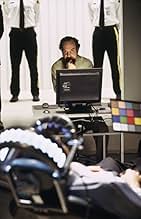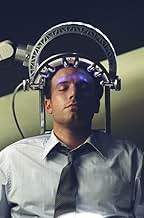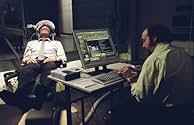Paycheck
- 2003
- Tous publics
- 1h 59min
Ce qui semblait être une idée géniale pour un ingénieur lui permettant de gagner des millions de dollars, lui fait risquer sa vie tout en lui permettant de comprendre pourquoi il est poursui... Tout lireCe qui semblait être une idée géniale pour un ingénieur lui permettant de gagner des millions de dollars, lui fait risquer sa vie tout en lui permettant de comprendre pourquoi il est poursuivi.Ce qui semblait être une idée géniale pour un ingénieur lui permettant de gagner des millions de dollars, lui fait risquer sa vie tout en lui permettant de comprendre pourquoi il est poursuivi.
- Réalisation
- Scénario
- Casting principal
- Récompenses
- 3 victoires et 2 nominations au total
Dee Jay Jackson
- Guard
- (as Deejay Jackson)
Avis à la une
Rating: ** out of ****
I wonder what it says about the state of cinematic science fiction that most of author Philip K. Dick's adaptations generally mix high-octane action with its interesting sci-fi concepts. Paycheck is no exception, hardly a surprise when you note it's from once beloved Hong Kong filmmaker John Woo, who's quickly reaching Michael Bay/Roland Emmerich levels of notoriety in the U.S. with each regressive film.
To be fair, Paycheck isn't unenjoyable, and it even gets off to a pretty good start. Set sometime in the near future, there's not much of a noticeable difference with our present time except for a few elaborate-looking gadgets and computers. Ben Affleck stars as Michael Jennings, a reverse engineer who's hired by major corporations to build products superior to all rival companies. Afterwards, his memory is erased by a partner of his (Paul Giamatti) and he's given a large paycheck for his time and troubles (usually the whole process takes about three months).
His latest offer comes from an old friend of his (Aaron Eckhart), who promises an eight-figure deal at the end of the transaction. The catch is that the whole procedure will take three years. Despite some reluctance, he agrees to the deal and when the three years pass by, Jennings, thinking he's a rich man, is shocked to discover he gave up over ninety million dollars in favor of an envelope containing twenty everyday household items. Now he finds himself on the run from both the FBI and the company that hired him, and must set out to discover what he built during those three years he's missing.
Uma Thurman also stars in the movie as Jennings' girlfriend during that three-year span, but she factors so lazily into the picture, she's obviously only in the film so that a) Jennings can have a love interest and b) he can also have someone to talk to about every little discovery he makes. Then again, function "b" could have worked just as well with Giamatti, but everyone knows a "sexy" chick is a better sell (I have to put quote marks around sexy because Thurman looks positively haggard for almost every minute of screen time she's present; I can't help but feel the much hotter Kathryn Morris would have done better in the role).
There are two concepts in this movie that specifically intrigue me (some moderate spoilers here), the first one is choosing deliberately to erase your own memory, but the notion is forgotten after the first half-hour. I was quite curious to know exactly what the process is like to the subject. Take, for instance, the fact that he lost his memory over the three-year span. Does the last thing he remembers feel like a three-year old memory or an event that happened just a second ago? Instead, all we get is a half-hearted (actually, not even that much) attempt at a sorrowful romance because he can't remember his girlfriend and she's not very happy about that.
The other major sci-fi concept, the ability to see into the future, isn't explored with much more interest and it leads to a number of baffling questions. You see (quite a few spoilers here), it's revealed Jennings sent himself those twenty items because they can come in handy at a specific moment that'll help him survive or escape from a dangerous situation.
But the thing is, Jennings couldn't have known each item would come in handy unless he used the device he built at least twenty times, because there's no way he'd know a motorcycle would come in handy if he never had, say, the bus ticket to escape from the FBI, meaning he used the device to see what he needed to escape the FBI, but still foresaw that he'd be killed in even more future events. That would mean this guy was originally destined to die or get caught in well over ten different scenarios (i.e. he had the bus ticket to escape, but if he didn't have the motorbike keys, he wouldn't have gotten further, and so on and so forth), but this is never really addressed.
By John Woo standards, there's surprisingly only a modest amount of action in the film, but at least the material is competently handled, even if it's not entirely believable. What might work in movies that establish their characters as supercops with impeccable aims doesn't come off quite as well in action scenes that feature scientists beating up a large number of armed goons. But if you suspend disbelief, the action scenes are pretty fun (especially the motorcycle chase and the laboratory battle), and coupled with the relatively fast pace, keep the movie perfectly watchable despite the poor script and mediocre acting (I never got into specifics, but this is Ben Affleck and Uma Thurman we're talking about).
When all is said and done, Paycheck is a wasted opportunity and is never as memorable a mixture of science fiction, mystery, and action as Minority Report, but it's likely to do the trick for undemanding fans of any of these genres. If you expect more, well, you'd do best to remember this is John Woo we're talking about, not Steven Spielberg.
I wonder what it says about the state of cinematic science fiction that most of author Philip K. Dick's adaptations generally mix high-octane action with its interesting sci-fi concepts. Paycheck is no exception, hardly a surprise when you note it's from once beloved Hong Kong filmmaker John Woo, who's quickly reaching Michael Bay/Roland Emmerich levels of notoriety in the U.S. with each regressive film.
To be fair, Paycheck isn't unenjoyable, and it even gets off to a pretty good start. Set sometime in the near future, there's not much of a noticeable difference with our present time except for a few elaborate-looking gadgets and computers. Ben Affleck stars as Michael Jennings, a reverse engineer who's hired by major corporations to build products superior to all rival companies. Afterwards, his memory is erased by a partner of his (Paul Giamatti) and he's given a large paycheck for his time and troubles (usually the whole process takes about three months).
His latest offer comes from an old friend of his (Aaron Eckhart), who promises an eight-figure deal at the end of the transaction. The catch is that the whole procedure will take three years. Despite some reluctance, he agrees to the deal and when the three years pass by, Jennings, thinking he's a rich man, is shocked to discover he gave up over ninety million dollars in favor of an envelope containing twenty everyday household items. Now he finds himself on the run from both the FBI and the company that hired him, and must set out to discover what he built during those three years he's missing.
Uma Thurman also stars in the movie as Jennings' girlfriend during that three-year span, but she factors so lazily into the picture, she's obviously only in the film so that a) Jennings can have a love interest and b) he can also have someone to talk to about every little discovery he makes. Then again, function "b" could have worked just as well with Giamatti, but everyone knows a "sexy" chick is a better sell (I have to put quote marks around sexy because Thurman looks positively haggard for almost every minute of screen time she's present; I can't help but feel the much hotter Kathryn Morris would have done better in the role).
There are two concepts in this movie that specifically intrigue me (some moderate spoilers here), the first one is choosing deliberately to erase your own memory, but the notion is forgotten after the first half-hour. I was quite curious to know exactly what the process is like to the subject. Take, for instance, the fact that he lost his memory over the three-year span. Does the last thing he remembers feel like a three-year old memory or an event that happened just a second ago? Instead, all we get is a half-hearted (actually, not even that much) attempt at a sorrowful romance because he can't remember his girlfriend and she's not very happy about that.
The other major sci-fi concept, the ability to see into the future, isn't explored with much more interest and it leads to a number of baffling questions. You see (quite a few spoilers here), it's revealed Jennings sent himself those twenty items because they can come in handy at a specific moment that'll help him survive or escape from a dangerous situation.
But the thing is, Jennings couldn't have known each item would come in handy unless he used the device he built at least twenty times, because there's no way he'd know a motorcycle would come in handy if he never had, say, the bus ticket to escape from the FBI, meaning he used the device to see what he needed to escape the FBI, but still foresaw that he'd be killed in even more future events. That would mean this guy was originally destined to die or get caught in well over ten different scenarios (i.e. he had the bus ticket to escape, but if he didn't have the motorbike keys, he wouldn't have gotten further, and so on and so forth), but this is never really addressed.
By John Woo standards, there's surprisingly only a modest amount of action in the film, but at least the material is competently handled, even if it's not entirely believable. What might work in movies that establish their characters as supercops with impeccable aims doesn't come off quite as well in action scenes that feature scientists beating up a large number of armed goons. But if you suspend disbelief, the action scenes are pretty fun (especially the motorcycle chase and the laboratory battle), and coupled with the relatively fast pace, keep the movie perfectly watchable despite the poor script and mediocre acting (I never got into specifics, but this is Ben Affleck and Uma Thurman we're talking about).
When all is said and done, Paycheck is a wasted opportunity and is never as memorable a mixture of science fiction, mystery, and action as Minority Report, but it's likely to do the trick for undemanding fans of any of these genres. If you expect more, well, you'd do best to remember this is John Woo we're talking about, not Steven Spielberg.
Philip K. Dick would be furious if he saw this latest adaptation of one of his stories. Things that shouldn't be explained are (e.g. the future machine sees into the future with a really powerful lens that can see around the curvature of the universe... THEN HOW DOES IT SEE INTO BUILDINGS?). Things that need explanations (like why people don't pull the trigger when they have a gun pointed at their enemy) don't get explained, probably because there is no rational explanation.
Every cliche in the book is on display here. The jocular banter between people is as bad as any 70's cop show. The action sequences are tired and overblown. In one ridiculous scene, just before the protagonist is set to die, a dove flies in through the door leaving the audience to wonder WHAT IN BLUE BLAZES?!?!?!
Hardly any of the main characters come off well. Uma Thurman looks about 50 years old for some reason. Ben Affleck can't act as usual. The scientist from Terminator 2 is in this playing some kind of bad-guy good-guy or something. I didn't bother thinking too hard about it.
The sad part is, I could see the brilliance of Philip K. Dicks story poking through the garbage once in a while. The premise is ingenious, but unfortunately every time it peeps its head out, John Woo takes a massive dump on it.
Every cliche in the book is on display here. The jocular banter between people is as bad as any 70's cop show. The action sequences are tired and overblown. In one ridiculous scene, just before the protagonist is set to die, a dove flies in through the door leaving the audience to wonder WHAT IN BLUE BLAZES?!?!?!
Hardly any of the main characters come off well. Uma Thurman looks about 50 years old for some reason. Ben Affleck can't act as usual. The scientist from Terminator 2 is in this playing some kind of bad-guy good-guy or something. I didn't bother thinking too hard about it.
The sad part is, I could see the brilliance of Philip K. Dicks story poking through the garbage once in a while. The premise is ingenious, but unfortunately every time it peeps its head out, John Woo takes a massive dump on it.
'Paycheck' is an action thriller with some amazing action sequences in the vain of the 'Bourne' films.
Ben Affleck stars as a brilliant computer engineer, Jennings, who must analyze a computer for a rival company. Once done, his memory for the time period it took him to do the job, is erased. His good billionaire friend, Rethrick, then offers him a job that could last up to three years. When Jennings accepts, the film jumps ahead three years, leaving the viewer wondering what the hell he did.
The plot then thickens when Jennings is told he forfeited his share, and is given an envelope with everyday items instead. Jennings then finds himself in a cat and mouse game on the run from the company - and Rethrick - he worked for. With only the contents of the envelope to unravel the mystery, the film is an interesting concept, and the viewer unravels it together with Jennings.
Uma Thurman serves as the film's love interest, Rachel.
'Paycheck' has a great production design and great action sequences and visuals. Although not always believable, it was a lot of fun! This was highly entertaining!
Ben Affleck stars as a brilliant computer engineer, Jennings, who must analyze a computer for a rival company. Once done, his memory for the time period it took him to do the job, is erased. His good billionaire friend, Rethrick, then offers him a job that could last up to three years. When Jennings accepts, the film jumps ahead three years, leaving the viewer wondering what the hell he did.
The plot then thickens when Jennings is told he forfeited his share, and is given an envelope with everyday items instead. Jennings then finds himself in a cat and mouse game on the run from the company - and Rethrick - he worked for. With only the contents of the envelope to unravel the mystery, the film is an interesting concept, and the viewer unravels it together with Jennings.
Uma Thurman serves as the film's love interest, Rachel.
'Paycheck' has a great production design and great action sequences and visuals. Although not always believable, it was a lot of fun! This was highly entertaining!
Though futuristic in look and tone, John Woo's `Paycheck' is really a throwback to that oldie about the man who wakes up one day as an amnesiac only to find himself being pursued by the authorities for a crime he may or may not have committed (just about every other Hitchcock film seemed to be built on this premise to one extent or another). The difference is that Michael Jennings is an amnesiac by choice, a brilliant engineer and scientist whose job it is to develop top-secret inventions for hi tech corporations. Once he's delivered the goods, he allows his memory to be erased thereby rendering him innocuous as a security threat - in exchange for the lucrative paychecks the companies offer him.
Yet another of the many recent adaptations of a Phillip Dick story, `Paycheck' begins in the present day, a strange choice on the part of the filmmakers actually, for in this film's view of 2004, the technology for memory erasure seems to be in full swing and widely accepted (perhaps the producers didn't want to have to deal with the expense or bother of creating futuristic designs for their sets and costumes). The majority of the story, however, takes place in 2007, after Jennings `wakes up' from a three-year stint working on a secret project about which he can remember nothing. The trouble is that things haven't quite worked out the way Jennings planned as he finds himself the quarry of both the FBI and the organization for which he was working. Of course, Jennings doesn't know why. As is customary with films of this type, we uncover the clues and piece together the picture right along with the increasingly more enlightened main character.
It's that piecing together that is the sole factor of interest in `Paycheck,' for Dick is clearly a writer with a fertile imagination and a gift for mind-bending storytelling. When the film sticks to unraveling its plot complications, it is generally sharp, intriguing and thought-provoking. Too often, though, the film degenerates into a collection of man-on-the-run, action movie clichés. Although the special effects are occasionally impressive, the far-too-frequent chase sequences defy all logic and believability. In fact, a number of scenes actually elicit a few unwanted giggles, so ludicrous and over-the-top are the setup and execution. Director Woo, past master of action spectaculars, is clearly working on autopilot in this film.
There isn't much to say about the acting, either. Although Ben Affleck and Uma Thurman - as the woman Jennings fell in love with during the three years, but whom he can no longer remember - do their best with the characters assigned to them, neither is given much chance to expand beyond the stereotypical confines of their respective roles.
When it comes to all those involved in this film, I suspect that Jennings isn't the only one here working solely for the paycheck.
Yet another of the many recent adaptations of a Phillip Dick story, `Paycheck' begins in the present day, a strange choice on the part of the filmmakers actually, for in this film's view of 2004, the technology for memory erasure seems to be in full swing and widely accepted (perhaps the producers didn't want to have to deal with the expense or bother of creating futuristic designs for their sets and costumes). The majority of the story, however, takes place in 2007, after Jennings `wakes up' from a three-year stint working on a secret project about which he can remember nothing. The trouble is that things haven't quite worked out the way Jennings planned as he finds himself the quarry of both the FBI and the organization for which he was working. Of course, Jennings doesn't know why. As is customary with films of this type, we uncover the clues and piece together the picture right along with the increasingly more enlightened main character.
It's that piecing together that is the sole factor of interest in `Paycheck,' for Dick is clearly a writer with a fertile imagination and a gift for mind-bending storytelling. When the film sticks to unraveling its plot complications, it is generally sharp, intriguing and thought-provoking. Too often, though, the film degenerates into a collection of man-on-the-run, action movie clichés. Although the special effects are occasionally impressive, the far-too-frequent chase sequences defy all logic and believability. In fact, a number of scenes actually elicit a few unwanted giggles, so ludicrous and over-the-top are the setup and execution. Director Woo, past master of action spectaculars, is clearly working on autopilot in this film.
There isn't much to say about the acting, either. Although Ben Affleck and Uma Thurman - as the woman Jennings fell in love with during the three years, but whom he can no longer remember - do their best with the characters assigned to them, neither is given much chance to expand beyond the stereotypical confines of their respective roles.
When it comes to all those involved in this film, I suspect that Jennings isn't the only one here working solely for the paycheck.
I went in to this film with relatively low expectations. Other reviews I had read led me to believe that this was a cookie cutter, run of the mill, made for tv-esque amnesia story. Nothing could be further from the truth.
The main plot of most amnesia types is trying to find out who they are and why someone erased their memory. With Paycheck, however, our protagonist already knows why his memory was erased, and since it's only been three years, he of course knows who he is.
The plot device is that at the end of this little memory wipe he's supposed to be 92 million dollars plus richer. Imagine his surprise when he finds out he's forfeit the money, and instead mailed himself some apparently worthless junk. Oh, and the company that hired him is trying to kill him.
This is what a Sci Fi movie should be, relying on an interesting premise, with future predictions based on current technology. Sci Fi is not space with explosions every five minutes.
Although there are a few minor plot holes, I found the movie very engaging, and thought the acting was competent, to say the least. Those who enjoyed Minority Report might also like Paycheck. It's worth a look.
bck
The main plot of most amnesia types is trying to find out who they are and why someone erased their memory. With Paycheck, however, our protagonist already knows why his memory was erased, and since it's only been three years, he of course knows who he is.
The plot device is that at the end of this little memory wipe he's supposed to be 92 million dollars plus richer. Imagine his surprise when he finds out he's forfeit the money, and instead mailed himself some apparently worthless junk. Oh, and the company that hired him is trying to kill him.
This is what a Sci Fi movie should be, relying on an interesting premise, with future predictions based on current technology. Sci Fi is not space with explosions every five minutes.
Although there are a few minor plot holes, I found the movie very engaging, and thought the acting was competent, to say the least. Those who enjoyed Minority Report might also like Paycheck. It's worth a look.
bck
Le saviez-vous
- AnecdotesThis was Ben Affleck's biggest paycheck to date, earning him approximately $15 million. Whenever he's asked to why he starred in the film, he responds "The answer lies in the title".
- GaffesThe "checkpoint" from where Michael's memory was supposed to be erased after finishing his first job is shown in a monitor as him walking with the box under his arm. However, he wouldn't have this image in his brain, but instead one from his own point of view.
- Citations
Michael Jennings: [quoting from a fortune cookie strip] If you only look where you can't go, you will miss the riches below.
- ConnexionsEdited into Paycheck: Deleted/Extended Scenes (2004)
- Bandes originalesMinute Waltz in D Flat Major Op. 64 No. 1
by Frédéric Chopin
Performed by Lincoln Mayorga
Courtesy of Townhall Records
Meilleurs choix
Connectez-vous pour évaluer et suivre la liste de favoris afin de recevoir des recommandations personnalisées
- How long is Paycheck?Alimenté par Alexa
Détails
Box-office
- Budget
- 60 000 000 $US (estimé)
- Montant brut aux États-Unis et au Canada
- 53 790 451 $US
- Week-end de sortie aux États-Unis et au Canada
- 13 462 374 $US
- 28 déc. 2003
- Montant brut mondial
- 117 248 958 $US
- Durée1 heure 59 minutes
- Couleur
- Mixage
- Rapport de forme
- 2.39 : 1
Contribuer à cette page
Suggérer une modification ou ajouter du contenu manquant





































